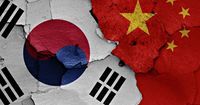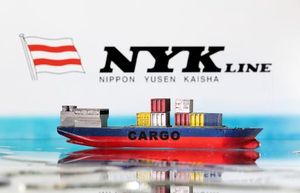In a significant escalation of trade tensions, China has recently urged South Korea to refrain from exporting products containing rare earth elements to American defense companies. This request, communicated through letters from the Ministry of Commerce of China, highlights the growing rift between China and the U.S., particularly in light of ongoing tariffs imposed by the Trump administration.
According to reports from Reuters and the Korea Economic Daily, the letters were sent to South Korean firms involved in the production of transformers, batteries, electric vehicles, and medical equipment—all of which utilize rare metals. The Chinese government warned that these companies could face sanctions should they violate the export restrictions.
This move comes as the U.S. heavily relies on imports for its rare metal needs, with a significant portion sourced from China. In retaliation for tariffs imposed by President Donald Trump on Chinese imports, Beijing has implemented its own export restrictions on certain rare earth elements, further complicating the trade landscape.
Chinese Premier Li Qiang has also reached out to Japanese Prime Minister Shigeru Ishiba, advocating for a coordinated response to U.S. tariff measures. In a letter sent via the Chinese embassy in Japan, Li emphasized the necessity for Japan and China to "fight together against protectionism." This plea underscores the interconnectedness of the economies and the potential for a united front against U.S. trade policies.
The backdrop to these developments is a broader trade conflict that has escalated over the past few years, with both nations grappling with issues ranging from tariffs to territorial disputes. Japan, a key ally of the United States, has been directly impacted by Trump's radical tariffs, prompting it to initiate negotiations to address the situation.
Relations between Beijing and Tokyo have been strained, with various factors contributing to the tension, including historical grievances and economic competition. As China calls for unity among its neighbors, it faces the challenge of balancing its economic interests with the need to maintain diplomatic relations.
The implications of these trade dynamics are far-reaching. The U.S. defense sector, which relies heavily on rare earth elements for various technologies, could face supply chain disruptions if China enforces strict export limitations. Moreover, the geopolitical ramifications of this trade war extend beyond economics, as nations navigate their alliances and positions in a rapidly changing global landscape.
As the situation unfolds, both South Korea and Japan must consider their strategic interests. South Korea, while economically tied to the U.S., must also weigh its relationship with China, a critical trading partner. The pressure from Beijing could lead to difficult decisions for South Korean companies that find themselves caught in the crossfire of this trade war.
China's recent actions signal a determination to assert its position in the global market, particularly in sectors where it holds a competitive advantage. The rare earth elements industry is a prime example, as China dominates the production and supply of these critical materials, essential for modern technology.
In conclusion, the unfolding trade conflict between China, South Korea, and the U.S. illustrates the complexities of international relations in a globalized economy. As nations grapple with the implications of tariffs and trade restrictions, the need for diplomacy and strategic alliances becomes increasingly apparent.






